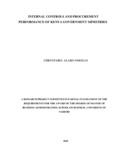| dc.contributor.author | Omollo, Chrystabe; A | |
| dc.date.accessioned | 2019-01-22T10:05:45Z | |
| dc.date.available | 2019-01-22T10:05:45Z | |
| dc.date.issued | 2018 | |
| dc.identifier.uri | http://hdl.handle.net/11295/105261 | |
| dc.description.abstract | The study pursued to perform an assessment of how the Kenyan Government Ministries’ performance on procurement is affected by internal controls. The following are the study objectives; to establish effects of monitoring and reporting controls on procurement performance and to establish the internal controls commonly used by the government ministries. The study was guided by agency theory, self-control theory and normative ethical theory. This study adopted a descriptive survey of all the 21 Ministries in Kenya. The study targeted procurement departments in all the 5 ministries which had a population of 110 at the ministries headquarters. The study picked 50% of the entire population and therefore the sample size for the study was 55 respondents. Questionnaires were used for data collection. It was then analyzed qualitatively and quantitatively through the use of content and descriptive analysis. Microsoft Excel and SPSS version were used to give results in form of percentages, tabulations, and measures of central tendency. This study concludes that ministry procurement systems are somewhat effective at detecting fraud and enhancing transparency and that procedures are defined in order to curb interference of statements or bills by persons who are not authorized before those statements are posted. Regarding effects of monitoring and reporting controls, the study concludes that majority of the ministries have a procurement monitoring and evaluation committees and that most of the committees are not effective in internal control roles. The study also recommends that all procurement departments in all ministries should be following procedures while undertaking their procurement duties to curb interference by persons not authorized. A manual for the ministries should be developed and all the procurement staff should be retrained on the application of the procedures. The heads of procurement department should develop a routine practice of reconciliation of records and proper resolutions for differences found. The ministries should also ensure that there are inspection committee to oversee procurement functions and provides feedback to the management about the effectiveness of preventive controls. The government should also come up with risk assessment methodology that will ease fraud, detection and prevent it from happening. This can be done through acquisition of tested and verified ICT software. The government through its various ministries should also create a department that monitor ministry procurement processes in a periodical manner. The department should be empowered in terms of financial resources, human resource and expertise. Also the study recommends that progressive reports on internal controls on procurement should be made to access the quality of procurement performance of the ministry. | en_US |
| dc.language.iso | en | en_US |
| dc.publisher | University of Nairobi | en_US |
| dc.rights | Attribution-NonCommercial-NoDerivs 3.0 United States | * |
| dc.rights.uri | http://creativecommons.org/licenses/by-nc-nd/3.0/us/ | * |
| dc.subject | Internal Controls and Procurement Performance of Kenya Government Ministries | en_US |
| dc.title | Internal Controls and Procurement Performance of Kenya Government Ministries | en_US |
| dc.type | Thesis | en_US |



